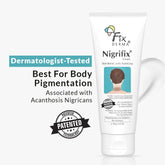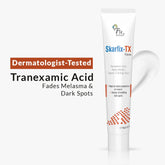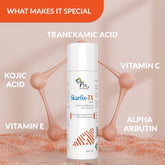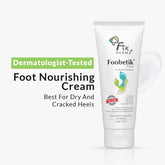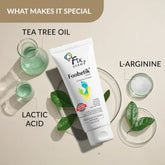Stress & Premature Aging: How Do Cortisol Levels Impact Your Skin?

Table of Content
- Cortisol and Aging: How Stress Speeds Up Skin Aging
- The Power of Cortisol: What This Hormone Means for Your Body and Mind
- Stress and Skin Aging: Uncovering the Hidden Connection
- Understanding the Science Behind Cortisol and Collagen Breakdown
- Cortisol and Aging: How Stress Contributes to Wrinkles
- Stress Hormone and Skin: Beyond Cortisol
- From Fine Lines to Dullness: The Aging Effects of Stress on Skin
- Managing Cortisol for Skin Health
- Skincare Routine To Combat The Effects of Stress and Cortisol
- Conclusion: Nurturing Resilient Skin for Long-Term Stress Defense
- Frequently Asked Questions (FAQ’s)
🤔Ever noticed more breakouts or fine lines during stressful times? That’s cortisol at work! High cortisol levels trigger excess oil production, which leads to acne, slowing skin repair and breaking down collagen—making wrinkles more likely to appear. So managing stress is truly an anti-aging secret!
Cortisol and Aging: How Stress Speeds Up Skin Aging
In today’s fast-paced world, stress has become an integral part of life. Unfortunately, it affects your mood and mental health but also badly impacts your skin. When we experience extreme stress, our bodies release higher levels of cortisol, a hormone that accelerates the aging process and shows visible signs of aging in our skin. This connection between stress, cortisol levels, and skin aging is crucial to understand if we aim to get youthful and healthy skin and complexion.
In this blog, we will explore the relationship between stress and skin aging, the effect of cortisol on our skin, the mechanism behind cortisol and collagen breakdown, and some strategies to reduce stress and promote healthier and youthful skin.
The Power of Cortisol: What This Hormone Means for Your Body and Mind
Cortisol is a hormone produced by the adrenal glands and is also termed a “stress hormone.” When our body experiences stress, cortisol is released to fight or flight by offering a temporary boost of alertness. However, if cortisol levels remain high for a long period, then they may harm various systems within the body, including the skin.
Cortisol not only affects the physical structure of the skin but also impacts the overall health of the body. Elevated cortisol levels lower the skin’s natural defense and lead to premature aging signs like wrinkles, fine lines, and loss of skin elasticity.
Stress and Skin Aging: Uncovering the Hidden Connection

One of the first places where signs of stress are visible is on the skin. Cortisol and other stress hormones affect the skin very badly and raise many skin-related concerns from premature aging to wrinkles, and acne.
- Reduction in collagen and elastin: Collagen and elastin are essential proteins that offer skin firmness and elasticity. Increased levels of cortisol hamper the production of collagen making the skin saggy and wrinkled and also lose its natural youthful glow. Over time due to chronic stress, the collagen and elastin break down and result in the early signs of aging due to stress.
- Decreased Skin Barrier Function: The outermost layer of the skin which is also known as the epidermis acts as a protective barrier against environmental damage, inflammation, etc. Stress hormones mainly cortisol weaken the skin barrier and make it more affected by external pollutants. This weakened barrier then results in dry, irritated, and damaged skin and shows signs of premature aging.
- Increased Inflammation: Chronic stress inflates the entire body and has a significant effect on the skin as well. Cortisol initially helps to reduce the inflammation but chronic stress leads to some major skin conditions like eczema, psoriasis, and rosacea. This inflammation further breaks down the collagen and increases the risk of skin sagging.
- Reduction in Skin Repair and Regeneration: Stress troubles the skin a lot. During rest, mainly sleep skin undergoes renewal and repair. High cortisol levels interface with the process and reduce the skin’s ability to heal and regenerate.
Understanding the Science Behind Cortisol and Collagen Breakdown
One of the major impacts of cortisol on skin health is collagen breakdown. Collagen is the protein in the body that gives structure to the skin and keeps it smooth and plumpy. When the cortisol level increases it reduces the skin elasticity and makes the skin saggy with fine lines and wrinkles.
Much research shows that cortisol hampers collagen production by promoting collagenase as it is an enzyme that is responsible for collagen breakdown. This double action makes the skin unable to maintain and rebuild its structure properly resulting in sagging skin and fine lines.
Cortisol and Aging: How Stress Contributes to Wrinkles
When the cortisol levels are elevated over a long period it has a very dramatic effect on the skin aging process. As cortisol encourages collagen breakdown, reduces skin elasticity, and increases dryness all these conditions help in forming wrinkles. Excess cortisol in the body makes the skin more problematic. So it clearly shows that over-stressed people will have high cortisol which leads to premature aging and the formation of wrinkles compared to the people who have less stress.
Stress Hormone and Skin: Beyond Cortisol

When we think about stress and its severe impact on the skin, cortisol is the first hormone that comes to mind. However cortisol is not only the stress hormone that affects the skin there are several other hormones including adrenaline, norepinephrine, and dehydroepiandrosterone which play a significant stress on the skin. Together these hormones affect the skin by causing issues like premature aging, increased inflammation, and skin sensitivity.
-
Cortisol - Primary Stress Hormone: Cortisol is produced by the adrenal glands in context to the stress and its primary function is to help the body respond to the stressors by triggering the fight or flight response.
Impact on Skin:- Collagen Breakdown
- Reduced Skin Repair
- Increased Oil Production
-
Adrenaline - The Fight or Flight Hormone: Adrenaline is another hormone that is released by the adrenal glands during acute stress. It is mainly known for triggering the fight or flight response by preparing the body for immediate action.
Impact on Skin:- Blood Flow Redistribution
- Sweating
- Tightened Skin
-
Norepinephrine - Stress Hormone that Controls inflammation: Norepinephrine is also known as noradrenaline and this hormone plays a crucial role in acute stress and inflammation
Impact on Skin:- Increases inflammation
- Weakens the skin barrier
- Increases Skin Concerns
-
Dehydroepiandrosterone - Balancing Horomone: DHEA is another hormone secreted by the adrenal glands and it plays an important role in helping the body balance the effect and impact of cortisol. While cortisol can be catabolic i.e. breaking down tissue like collagen whereas DHEA is anabolic i.e. it supports the tissue growth and repair.
Impact on Skin:- Anti-Aging Effect
- Declining Levels with age
- Balancing Cortisol
From Fine Lines to Dullness: The Aging Effects of Stress on Skin

The effect of stress on the skin is visible. From dull complexion to premature wrinkles and sagging here are some signs of skin aging and stress.
- Fine Lines and Wrinkles: As we know the breakdown of collagen results in fine lines and wrinkles that appear usually earlier than expected. These premature wrinkles can be visible mainly in areas like the eyes, mouth, and forehead.
- Dull and Dry Skin: Chronic stress makes the skin barrier weak and it becomes difficult to retain the moisture. This loss of moisture leads to dull and dry skin.
- Extreme Inflammation-Related Skin Issues: Extreme inflammation may raise skin conditions like eczema, rosacea, and acne which damages the skin texture and leads to premature aging.
- Hyperpigmentation and Dark Circles: Stress can cause pigmentation which triggers the overproduction of melanin. This leads to uneven skin tone and dark circles which makes the skin dull.
Managing Cortisol for Skin Health

To minimize the impact of cortisol and other stress hormones on the skin’s health it is very essential to practice and reduce the level of cortisol. Let’s look at some effective ways to keep stress in check for a healthy skin
- Regular Exercise: Physical activity is one of the most effective ways to reduce cortisol. Exercising regularly encourages the release of endorphins which are natural mood filters and also help to regulate cortisol levels. Performing regular exercise helps for better sleep which is very essential for skin repair and rejuvenation.
- Adequate Sleep: Sleep is very important and crucial for reducing cortisol levels and promoting skin health. Good sleep allows the body to repair itself including the skin so aim to sleep 7 to 9 hours of quality sleep each night to reduce the wrinkles and reduce the signs of aging.
- Mindfulness and Meditation: Practising mindfulness and meditation can simply reduce stress levels by lowering cortisol levels. Some techniques like deep breathing, yoga, and meditation help to improve resilience to stress by reducing the effect of cortisol on the skin.
- Hydration: Drinking enough water is very essential for maintaining and keeping the skin hydration mainly when stress dehydrates the skin. Water helps to remove all the toxins and support cellular repair which is very essential for skin health.
- Limiting the Caffeine and Sugar: Both caffeine and sugar can directly increase cortisol levels if consumed in excess. So consume these ingredients mindfully to maintain the cortisol levels for healthier skin.
Skincare Routine To Combat The Effects of Stress and Cortisol

A consistent skincare routine helps to support collagen production, restore hydration reduce inflammation, and reduce the signs of aging. Here is a skincare routine to reduce the effect of cortisol
-
Cleanser: Stress can hamper the moisture of the skin barrier so it is very essential to use a gentle cleanser that doesn't take away the skin's natural oils. Look for ingredients that give soothing effects on the skin like aloe vera, chamomile, or glycerin.
Recommended Product: Fixderma Mandefix Foaming Face Cleanser. This gentle face cleanser is infused with 3 powerful exfoliants i.e., Mandelic acid, Salicylic acid, and Azelaic acid which work on multiple pathways to clear the skin problems related to acne, hyperpigmentation, and signs of aging. - Toner: A toner helps to restore and keep the hydration of the skin intact. It also helps to balance the pH and calms skin irritation and stress. Look for ingredients like rose water, chamomile, or hyaluronic acid.
-
Serum: Antioxidant helps to fight free radicals which cause stress and leads to aging. A good serum supports the skin repair processes. Consider looking for ingredients that have vitamin C, niacinamide, or ferulic acid and are excellent for skin defense.
Recommended Product: Fixderma 17% Vitamin C Face Serum. Crafted with meticulous attention to detail, our serum combines the highest quality, pure Vitamin C with a potent blend of natural antioxidants and skin-nourishing ingredients. This carefully curated combination ensures maximum efficacy and absorption, delivering exceptional results. -
Moisturizer: A good moisturizer helps to balance the skin’s barrier and retains the moisture. Mainly peptides are beneficial for encouraging collagen production and firming the skin. It includes ingredients like hyaluronic acid, ceramides, peptides, and glycerin.
Recommended Products: Fixderma Durave Barrier Repair Face Moisturizer. When the skin barrier is compromised, skin starts to feel dry, irritated, or feels like it is missing elasticity. The outermost layer that shields your skin from environmental aggressors needs to be protected and the Barrier Repair Face Moisturizer does exactly that. It's a powerful ally in restoring skin's natural defenses, strengthening skin’s strength, and leaving it feeling healthy, supple, and radiant. -
Eye Cream: Stress and elevated levels of cortisol can cause puffiness and dark circles under the eyes which makes the eyes look dull and tired. Using cream containing caffeine will help reduce the swelling and peptides help to reduce the dark circles and make the skin firm.
Recommended Product: Fixderma Under Eye Cream is a unique combination of skin-tightening ingredients that provide triple-action power to diminish dark circles, reduce fine lines and wrinkles, and combat puffiness. The hypoallergenic formula works by creating a thin, water-soluble film over the face, which actively lifts and tightens the skin's appearance. -
Sunscreen: Sunscreen is very crucial for preventing premature aging which is caused by UV rays. UV radiation breaks down the collagen and leads towards wrinkles so daily using sunscreen is very beneficial. Look for a sunscreen that has ingredients like zinc oxide, titanium oxide, or avobenzone.
Recommended Product: Fixderma Shadow SPF 30+ Gel. It is a gel-based sunscreen that is an ideal formulation for oily and combination skin types. The lightweight and non-greasy formulation is packed with both physical and chemical sun protectors which makes it perfect for all skin types. This oil-free formulation provides long-lasting broad-spectrum UV protection and leaves no white cast. -
Night Time Treatments: For night treatments retinoids are beneficial as they stimulate collagen production and reduce fine lines and wrinkles. Consider using products that contain retinoids which are ideal for reducing the signs of ageing.
Recommended Product: Fixderma Anti-Aging Face Serum is expertly formulated to boost collagen production and enhance skin firmness and elasticity. This advanced serum is a potent blend of peptides, pro-retinol, and hyaluronic acid that work synergistically to fight visible signs of aging such as fine lines and wrinkles.
Conclusion: Nurturing Resilient Skin for Long-Term Stress Defense
In today’s world, it is very easy to overlook emotional well-being that can impact our skin’s health. So to reduce stress for achieving healthy skin is not only about reducing anxiety but also minimizing the cortisol and collagen breakdown and protecting the skin against external stressors. By following well-defined strategies and managing cortisol levels we can easily improve and enhance our skin health and overall well-being.
So in short building a resilient skincare routine and prioritizing self-care will help to manage the stress and protect the skin against the impact of stress. So focus on skin health for long-lasting benefits that lead towards youthful and healthy skin.
Frequently Asked Questions (FAQ’s)
-
How does cortisol affect skin health?
Cortisol, known as the stress hormone, triggers inflammation and increases oil production, which can lead to acne and breakouts. Over time, high cortisol levels also accelerate collagen breakdown, weakening skin’s structure and causing wrinkles, sagging, and loss of elasticity. -
Why does stress make my skin more sensitive and reactive?
Stress compromises the skin’s protective barrier, making it more prone to irritation, dryness, and sensitivity. High cortisol disrupts moisture retention and increases inflammation, leaving the skin more vulnerable to environmental stressors. This often leads to redness, itching, and flare-ups in conditions like eczema or rosacea. -
How can lifestyle changes help manage cortisol levels for better skin?
Incorporating stress-management techniques like meditation, regular exercise, and quality sleep helps lower cortisol. Eating a balanced, antioxidant-rich diet can support skin health while staying hydrated keeps skin resilient. These habits not only help lower cortisol but also contribute to a more youthful, glowing complexion.
